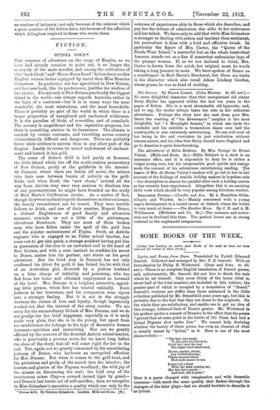FI CTION.
GITLNEI GOLD.*
THE romance of au/venture on the verge of Empire, as we have had already occasion to point out, is no longer the monopoly of the male novelist, and among the cultivators of this " back block" and' Never Never Land" fiction there are few English writers better equipped by travel than Miss Beatrice Grimshaw. In particular she has specialized in New Guinea, and her new book, like its predecessor, justifies the wisdom of her choice. For not only is New Guinea practically the biggest island in the world—one always regards Australia rather in the light of a continent—but it is in many ways the most wonderful, the most mysterious, and the most formidable. There is probably no part of the world in which there is a larger proportion of unexplored and uncharted wilderness. It is the paradise of birds, of crocodiles, and of cannibals. The scenery is magnificent and the vegetation gorgeous, but there is something sinister in its luxuriance. The climate is marked by violent contrasts, and travelling across country extraordinarily difficult and dangerous. There are probably fewer white settlers to natives than in any other part of the Empire. Lastly, to crown its mixed endowment of enchant- ment and horror, it has gold.
The scene of Guinea Gold is laid partly at Samarai, the little island which lies off the south-eastern promontory of New Guinea, partly at the goldfields in the interior. At Samami, where there are hotels (of sorts), the miners take their ease between bursts of activity on the gold- fields, and when Scott, the "new chum," arrived all the way from Antrim they were very anxious to disabuse him of any preconceptions he might have founded on the study of Bret Harte's Californian stories. As a matter of fact, though theywere inclined to pride themselves on theirreticence, the family resemblance can be traced. They were terrible fellows to drink, and one of their number, Rupert Dence, a dgelassi Englishman of good family and attractive manners, reminds us not a little of the picturesque, chivalrous Deerhurst.' They are most of them broken men, who have fallen under the spell of the gold lure and the sinister enchantment of Papua. Scott, an Antrim engineer who is engaged-to-an- Ulster school teacher, has come out.to get rick quick, a strange accident having put him in possession of the clue to an unworked reef in the heart of New Guinea, and with a sure instinct ho confides his secret to Dence, makes him his partner, and starts on his great adventure. But his brief stay in Samarai has not only confirmed his thirst for gold, it has linked his lot with that of an Australian girl, divorced by a jealous husband on a false charge of infidelity and poisoning, who has fled from her home and obtained employment as barmaid at the hotel. Mrs. Ducane is a helpless, attractive, appeal- ing little person, whom fate has treated unkindly. Scott believes in her innocence, and his compassion soon ripens into a stronger feeling. But it is not in the struggle between the claims of love and loyalty, though ingeniously worked out, that the interest of the story resides. We are sorry for the extraordinary ill-luck of Mrs. Ducane, and we do not grudge her her brief happiness, especially as it is early made very plain that she is to die young, but apart from her misfortunes she belongs to the type of decorative human doormat—spiritless and unresisting. Nor are we greatly afflicted by the sorrows of the deserted Antrim school-teacher, who is practically a persona mutt; for we know, long before the close of the story, that all will come right for her in the end. Nor, again, are we greatly concerned by the smouldering jealousy of Dence, who harbours an unrequited affection for Mrs. Ducane. But when it comes to the gold hunt, and the privations and perils of the march into the interior ; the horrors and glories of the Papuan woodland ; the wild joy of the miners on discovering the reef; the bold coup of the treacherous miner Clay—a coward turned tiger by greed— and Denee's last heroic act of self-sacrifice; then we recognize in Miss Grimslaaw's narrative a quality which can only,be the • THanya Gila: Wm:4*c° Vrinnhaw. London:. Mins aad Boon. Lk]
outcome of. experiences akin.to thoae whioh she describes, and pay her the tribute of admiration due alike to her endurance and her talent.. We have only to add that while Miss Grimabaw is stronger in dealing with action and incident than sentiment, her portraiture is done with a bold and effective brush. In particular the- figure of Mrs. Carter, the " Queen of the North-West Island," a masterful but on the whole benevolent Amazon, stands out as a fine if somewhat unfeminine type of the pioneer woman. If, as we are inclined to think, Mrs. Carter is drawn from the quick, her original must be worth taking a long journey to meet. We have spoken of Dence as a counterpart to Bret Harte's Deerhurst, but there are traits in his character which also recall Adam Lindsay Gordon, whose poems he was so fond of reciting.














































 Previous page
Previous page